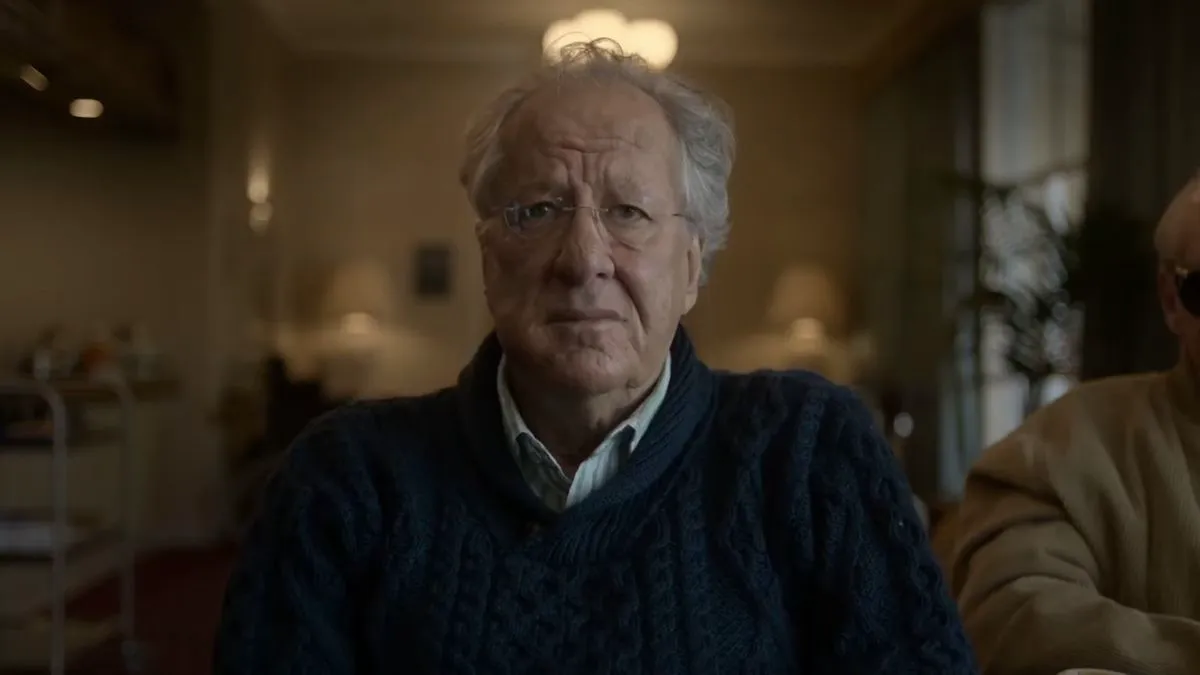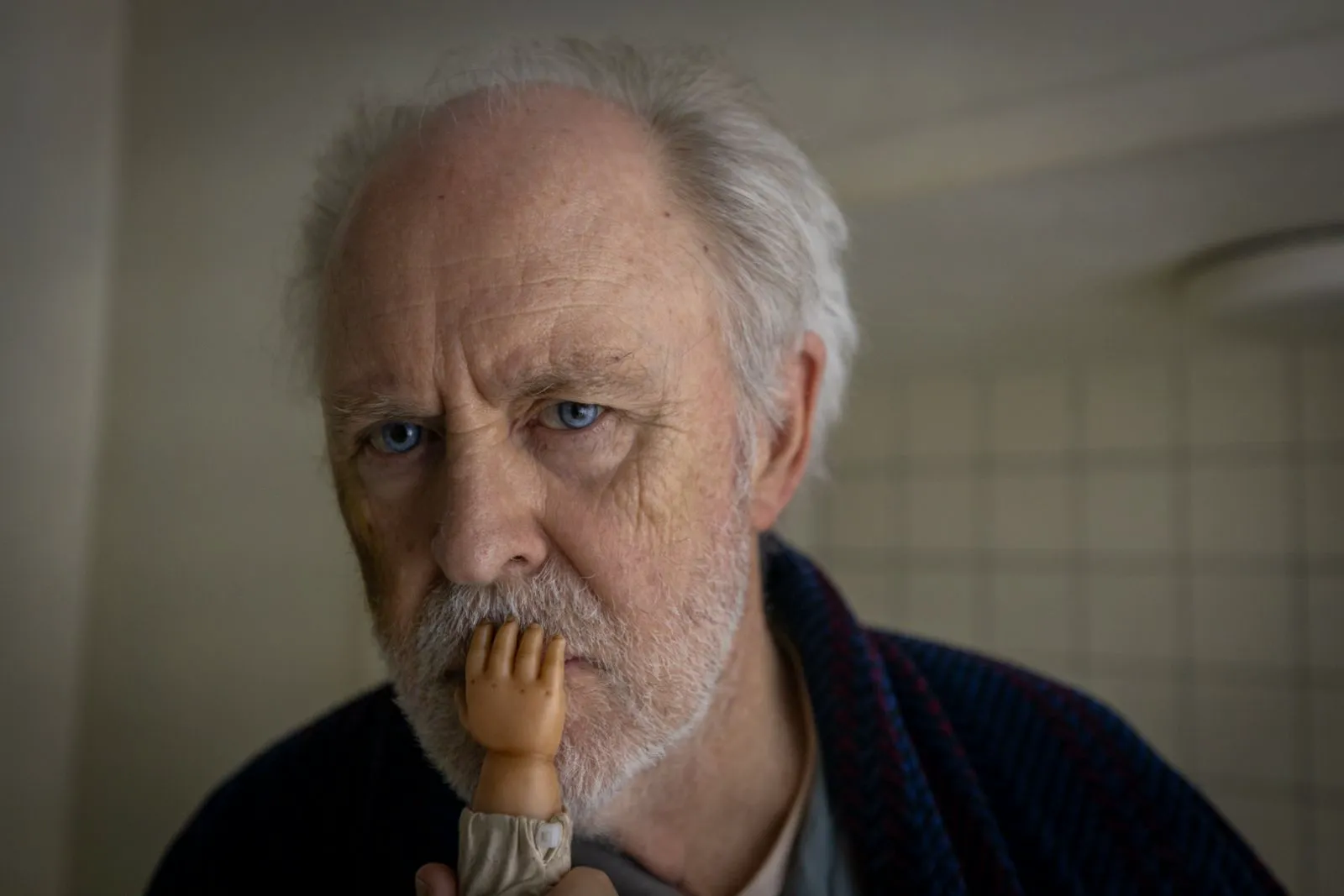The Chilling Confinement of “Settle in Fear”
Stefan Mortensen (Geoffrey Rush), a judge who once delivered verdicts with solemn grandeur – even accusing a victim’s mother of indifference – suffers a stroke. Stripped of his physical control and accustomed pedestal, he finds himself in a nursing home, where many are living out their final days. Here, the former judge encounters the sinister, blue-eyed Dave Creeley (John Lithgow), a madman with a disturbing attachment to a glove puppet named Jenny Pen, through which he dictates his own twisted rules, holding his neighbors in fearful anticipation of nightfall.

Geoffrey Rush as Stefan Mortensen in a still from “Settle in Fear”
While Cynthia Scott’s gentle drama “The Company of Strangers” sees elderly women peacefully reflecting on their lives in isolation, the characters in James Ashcroft’s “Settle in Fear” are far from nostalgic – they are consumed by plans for the immediate future. Dave Creeley plots his next act of cruelty (dousing a patient in urine or sending an old woman wandering beyond the safe zone?), Stefan Mortensen prepares his retaliation (filing a complaint or hiding the asthmatic puppeteer’s inhaler?), and his roommate, former rugby player Tony Garfield (George Hinar), frantically seeks temporary escape (hiding in the laundry room?) to avoid the crossfire and another “kiss for Penny.”
A Descent into Madness
The clash between the two old men escalates into a full-blown war, where logic and reason are soon abandoned. Each evening, Stefan roams the nearly deserted corridors in his wheelchair, searching for answers. Like Jack Torrance arriving at the Overlook Hotel, Geoffrey Rush’s character believes he will endure a season or two before returning to his former life. However, the nursing home drains the elderly man’s vitality, transforming him from a cold and arrogant judge into one of the sad and lonely residents, losing memory, reason, and even the ability to grip a paper cup. It seems as if the demonic puppet is about to emerge from around the corner and, like a dementor, suck the last months of life from the unfortunate man, but Stefan’s eyes are drawn back to its owner. An aged Dave, a young Dave, a very young Dave. Photos of the puppeteer adorn not only his room’s door but also the walls of the facility. Wait, how long has he been playing these inhuman games with the residents? What was he doing here in the 1960s?

John Lithgow as Dave Creeley in a still from “Settle in Fear”
A Battle of Acting Titans
As the viewer is lost in speculation, John Lithgow unleashes a wickedly playful performance, while Geoffrey Rush responds with equally expressive defiance, spinning the wheels of his chair in haste. Their pairing is an acting duel with no weak link. Rush masterfully conveys Stefan’s journey from arrogance to despair, while Lithgow embodies a spectrum of emotions, as if he is not controlling Jenny Pen, but she is controlling him. It’s no surprise that the actors shared the Best Actor award at the Sitges Film Festival – choosing whose performance was superior is simply impossible.
A Nightmare of Repetition and Despair
The film feels like a nightmare woven from recurring details, close-ups of lost faces, and incessant noise: screams, groans, and whispers. “Beware of that cat,” one of the residents of the “Royal Pine Mews” nursing home warns with concern, pointing to a quiet animal nearby. “It is a harbinger of death.” Stefan dismisses the warning, and just a few minutes later, the speaker bursts into flames, like a match doused in kerosene. However, the event shocks only the viewer – the residents and staff react to the tragic death with stoic indifference, as if it happens five times a day.

John Lithgow as Dave Creeley in a still from “Settle in Fear”
In this New Zealand nursing home, death and its accompanying events are met with a detached acceptance, with no need to check security cameras, occasionally visit patients at night, or investigate the causes of conflict between the elderly, who break dishes, scream, and hurl accusations daily. The nursing home is presented as a place where time has long stood still – what matters is not what happens, but what does NOT happen, namely any increased attention to the disturbances.
Jenny Pen wraps herself in red curtains, grows to the size of a doorway, hides in a dresser, and shoves her little hands into the mouths of dying old men. She continues her game, feeding on the despair of the elderly and the indifference of the staff, a ghost passing through closed spaces. And while Stefan’s initial arrogance and Dave’s outrageous antics may elicit a faint smile at first, it soon becomes clear that black humor goes hand in hand with tragedy – liberation can only be found in death.